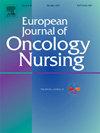肿瘤科护士决策及人格特质对护理失察的影响及相关因素的相关研究。
IF 2.7
3区 医学
Q1 NURSING
引用次数: 0
摘要
目的:了解葡萄牙两家癌症医院护士护理缺失(MNC)及相关因素,分析护士决策和人格特质对MNC的影响。方法:采用横断面、多中心、描述性相关研究,选取两家癌症护理医院的298名护士作为方便样本。数据收集于2023年第一学期,使用问卷调查,包括社会人口统计学和专业问题,葡萄牙语版MISSCARE调查,护理决策工具(NDMI-PT)和十项人格量表(TIPI-P)。结果:护士在患者授权/自主护理和喂养用药效果相关维度中偶尔出现护理缺失。人员配备、患者数量和敏锐度、管理和组织是导致跨国公司发生的中等到重要原因。灵活决策方式占主导地位(81.5%)。最普遍的性格特征是尽责性、宜人性和开放性。决策过程的四个阶段与跨国公司的人格特质和几个维度之间存在显著的相关性。评估患者病情的数据收集与团队沟通和物质资源呈负相关。同样,情绪稳定特质与团队沟通、患者数量和敏锐度呈负相关。结论:本研究确定了MNC和影响护理质量的因素。在医疗团队中促进护士的培训和专业化是至关重要的,特别注重提高他们的一些个性特征,使他们成为更有效和高效的治疗药物。本文章由计算机程序翻译,如有差异,请以英文原文为准。
Influence of oncology nurses' decision-making and personality traits on missed nursing care and related factors: A correlational study
Purpose
To identify Missed Nursing Care (MNC) and related factors, as well as analyze the influence of nurses’ decision-making and personality traits on MNC in two Portuguese hospitals dedicated to cancer care.
Methods
A cross-sectional, multicentric, descriptive-correlational study was conducted using a convenience sample of 298 nurses working in two hospitals dedicated to cancer care. Data were collected in the first semester of 2023 using a questionnaire that included sociodemographic and professional questions and the Portuguese versions of the MISSCARE Survey, the Nursing Decision-Making Instrument (NDMI-PT), and the Ten-Item Personality Inventory (TIPI-P).
Results
Nurses missed care occasionally, namely in the dimensions related to Patient empowerment/autonomy care and Efficacy of feeding and medication. Staffing, Patient volume and acuity, and Management and organization were moderate to significant reasons for MNC. The flexible decision-making style was predominant (81.5%). The most prevalent personality traits were Conscientiousness, Agreeableness, and Openness to experience. Significant correlations were found between the four stages of the decision-making process and the personality traits and several dimensions of MNC. Data collection to assess a patient's condition was negatively correlated with Team communication and Material resources. Similarly, the Emotional stability trait was negatively correlated with Team communication and Patient volume and acuity.
Conclusions
This study identified MNC and factors that can influence the quality of care. It is crucial to promote nurses’ training and specialization within healthcare teams, with a particular focus on enhancing some of their personality traits to make them more effective and efficient therapeutic agents.
求助全文
通过发布文献求助,成功后即可免费获取论文全文。
去求助
来源期刊
CiteScore
4.40
自引率
3.60%
发文量
109
审稿时长
57 days
期刊介绍:
The European Journal of Oncology Nursing is an international journal which publishes research of direct relevance to patient care, nurse education, management and policy development. EJON is proud to be the official journal of the European Oncology Nursing Society.
The journal publishes the following types of papers:
• Original research articles
• Review articles

 求助内容:
求助内容: 应助结果提醒方式:
应助结果提醒方式:


